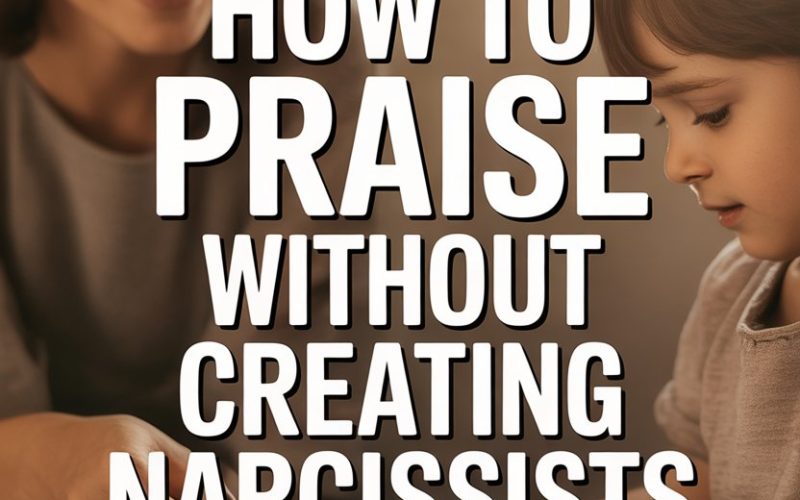We all want confident kids. The kind who march up to the playground, introduce themselves, and maybe even eat their vegetables with a flourish.
But what parent hasn’t wondered: could all this cheering and “Great job, buddy!” actually turn my darling into a tiny egomaniac? A praise monster?
Fear not. The truth is, encouraging your child and helping them develop healthy self-esteem doesn’t require inflating their ego.
It requires a bit of finesse, a sprinkle of self-awareness, and the willingness to laugh at ourselves along the way.
The Praise Problem
Praise isn’t evil. It’s not even suspicious.
Kids thrive on encouragement, and hearing their parents’ approval lights them up from the inside. But not all praise is created equal.
Researchers have been poking around this question for decades, and the verdict is clear: blanket praise (“You’re amazing!” for literally breathing) can backfire, leading to fragile self-worth and, yes, a streak of narcissism.
This study from the University of Utrecht found that kids lavished with inflated praise (“You’re incredibly smart!”) were more likely to develop narcissistic traits than those receiving realistic, specific feedback.
Turns out, gold stars aren’t always golden.
Why General Praise Can Backfire
Sweeping compliments sound lovely, but they teach children to rely on external validation. When kids are constantly told they’re “the best,” they start believing their value hinges on being impressive rather than being themselves.
Here’s what often happens:
- Kids tie their self-worth to praise and external rewards.
- They become risk-averse, only tackling tasks they know will earn applause.
- Some inflate their self-importance, expecting the world to clap for every cartwheel.
And when the real world (spoiler alert: it’s a bit stingy with praise) doesn’t deliver, they crumble or get cranky.
The Magic of Specific Praise
Instead of sprinkling “Good job!” like confetti, focus on what your child actually did. “You stacked all your books by size” or “I noticed you shared your snack with your sister.”
Specific praise highlights effort, behaviour, or progress, not just innate ability.
Psychologist Carol Dweck’s work on growth mindset highlights the power of praising the process: “You worked really hard on that puzzle” trumps “You’re so smart!”
Why? Because it teaches children that effort and strategies matter, not just natural talent.
Bonus: Specific praise feels genuine. Kids have built-in radar for flattery, and they’ll call you out (or just tune you out) if they suspect you’re being insincere.
Effort Over Ego
If there’s one mantra to tattoo on your brain (okay, maybe just on a sticky note), it’s this: Praise effort, not ego.
Notice when your child sticks with something tricky, even if the end result is a lopsided cake or a Lego spaceship missing a wing. Say something like, “I saw you kept trying even when it was tough.”
Praise persistence, creativity, kindness, and patience. When children link praise to effort, they develop grit—a superpower for life.
Mind the Comparison Trap
“You’re the best reader in your class!” might sound encouraging, but it sets kids up for a lifelong competition (and not the fun, three-legged-race kind).
Comparison-based praise teaches children to measure themselves against others. This can spark jealousy, resentment, or a constant need to one-up their peers.
Instead, notice individual progress: “You read more pages today than last week.” It’s about their journey, not their rank.
Don’t Dodge Disappointment
Parents often praise to soften life’s blows. Maybe your child loses a game, and you rush in with, “You were still the best out there!”
It’s tempting, but children need space to feel disappointment, frustration, or even boredom. These emotions aren’t toxic—they’re training wheels for real life.
Try acknowledging effort and offering comfort: “I saw you tried your hardest. It’s tough to lose, but I love how you shook hands at the end.”
Allowing kids to experience a range of feelings builds resilience, not entitlement.
Keep It Real
Honesty sounds obvious, but it’s easy to get caught in a vortex of automatic “Wows!” and “Amazings!” Sometimes your kid’s crayon drawing looks more like abstract modern art than a cat, and that’s okay.
Find something genuine you can highlight—colour choices, the story behind the picture, or the way they stuck with it. If you can’t think of anything nice, just say, “Tell me about your picture.”
Kids love having your attention, and they can spot a fake compliment a mile away.
Praise the Process, Not Just the Product
It’s easy to celebrate the A+ or the winning goal, but the real gold lies in the process. Notice the small steps: reading every night, practicing the violin, saying “please” without reminders.
“Watching you practice every day made me really proud,” or, “You kept going, even when it got tricky.” This reinforces that progress matters more than perfection.
Model Self-Compassion
Ever noticed how kids pick up on your self-talk? If you mutter, “I’m rubbish at this” after burning the toast, don’t be surprised if your small person starts rating themselves harshly too.
Show them what it looks like to make mistakes and try again. Say, “Well, that didn’t go as planned, but I’ll try a different way next time.”
Modelling self-compassion helps children see that everyone has strengths and struggles—and that’s normal.
Catch Kindness in Action
Ego-driven praise makes kids feel special for being “the best.” Values-based praise helps them recognise what really matters: kindness, generosity, curiosity.
“When you shared your toys, your friend looked so happy.” Or, “You noticed your friend was sad and gave them a hug. That was so thoughtful.”
Research published in Child Development shows that children who receive praise for prosocial behaviours are more likely to repeat them than those praised for intelligence or looks.
When to Zip It
Sometimes the best praise is none at all.
Kids don’t need a running commentary. They thrive with quiet confidence, the sense that you see them and love them whether they’re building sandcastles or just licking the spoon.
Let them bask in their own pride. When your child beams after tying their shoes, a smile or a wink can say it all.
A Word on Social Media Bragging
It’s natural to share your child’s triumphs with family and friends. Photos of soccer trophies and spelling bees fill up our feeds.
Just remember that kids absorb everything. If your praise lives online, your child might start feeling like their worth is measured by likes and comments.
Celebrate moments for what they are—a sign of growth, not currency for external approval.
Praise That Grows With Your Child
Young children need plenty of encouragement, but as they get older, praise should evolve. Teenagers, especially, have a sixth sense for well-meaning parental flattery.
They’re more likely to respond to conversation than platitudes.
Try, “What was the toughest part of that project for you?” or, “How did you figure that out?” Show curiosity in their process, and save the ticker-tape parade for genuine milestones.
Practical Strategies for Tonight
Ready to try some new praise habits at home? Here are three you can steal:
- Swap “You’re so smart” for “You figured out a really clever way to solve that problem.”
- Instead of “You’re the best player” try “Your effort at practice today was impressive.”
- Replace “Beautiful drawing!” with “I love the colours you chose and how you filled the whole page.”
Notice what shifts—not just in your child, but in yourself.
The Sweet Spot
The secret’s out: praise is a tool, not a magic spell. Used thoughtfully, it helps kids feel seen, valued, and brave enough to try, fail, and try again.
Children who receive sincere, specific praise grow into adults who can cheer for themselves—and for others.
They don’t need the world’s applause, just a quiet confidence that they’re doing alright (even if their Lego spaceship never gets off the ground).
And really, isn’t that what we wish for all our kids? Confidence without cockiness, kindness without calculation, resilience, and a sense of humour about the whole messy business of growing up.
Here’s to raising humans who shine from the inside out—no trophies required.





